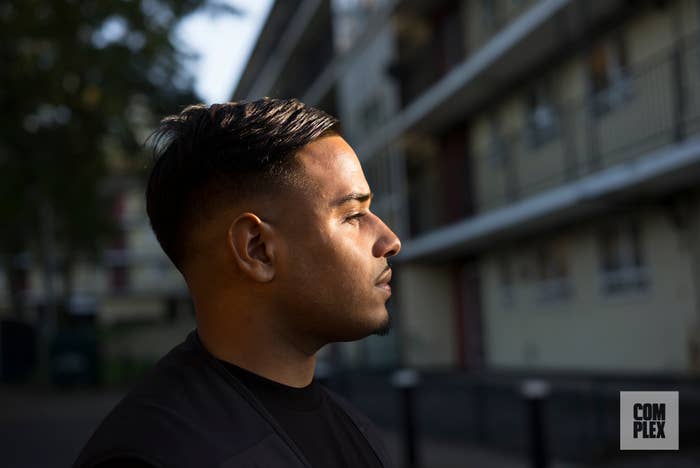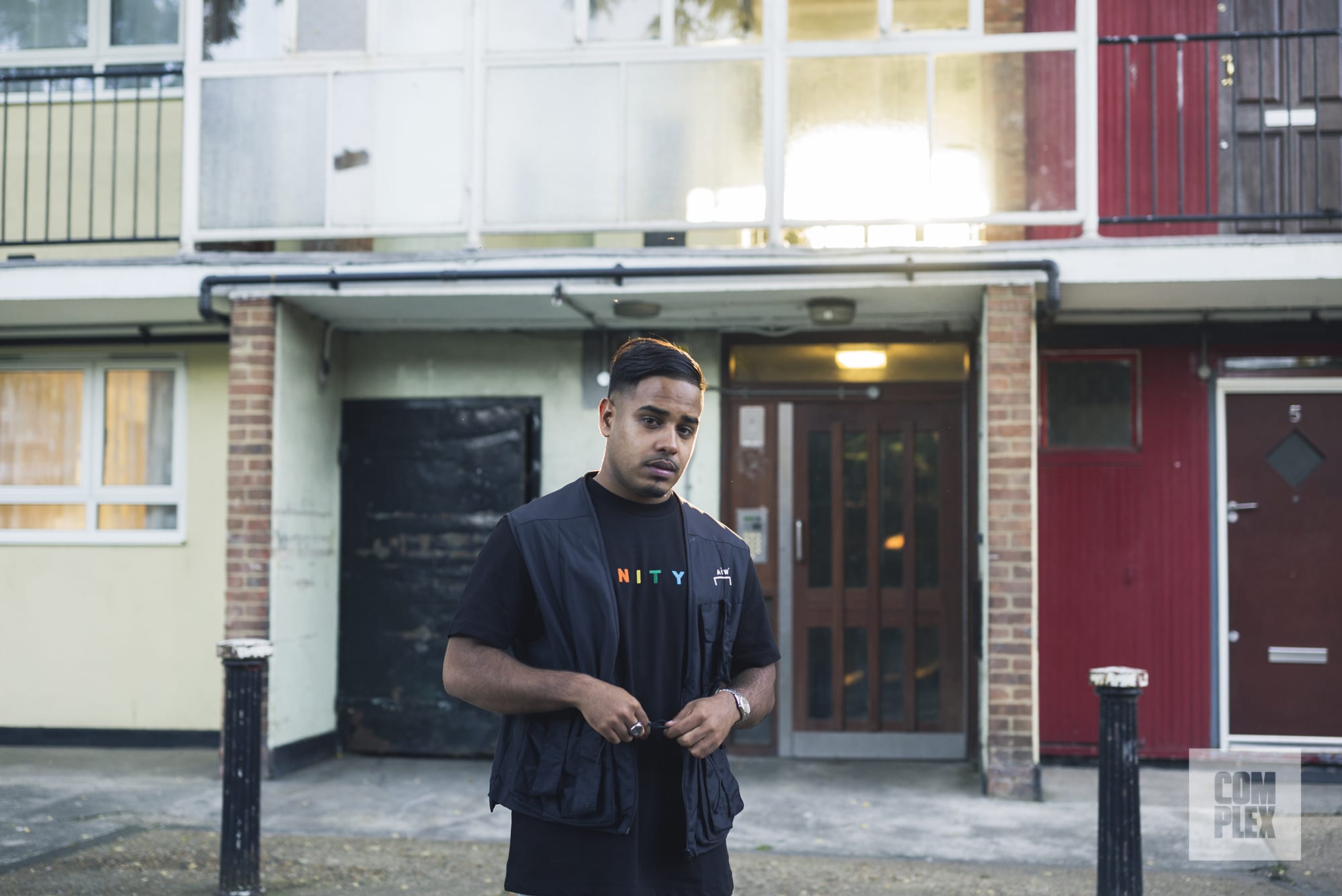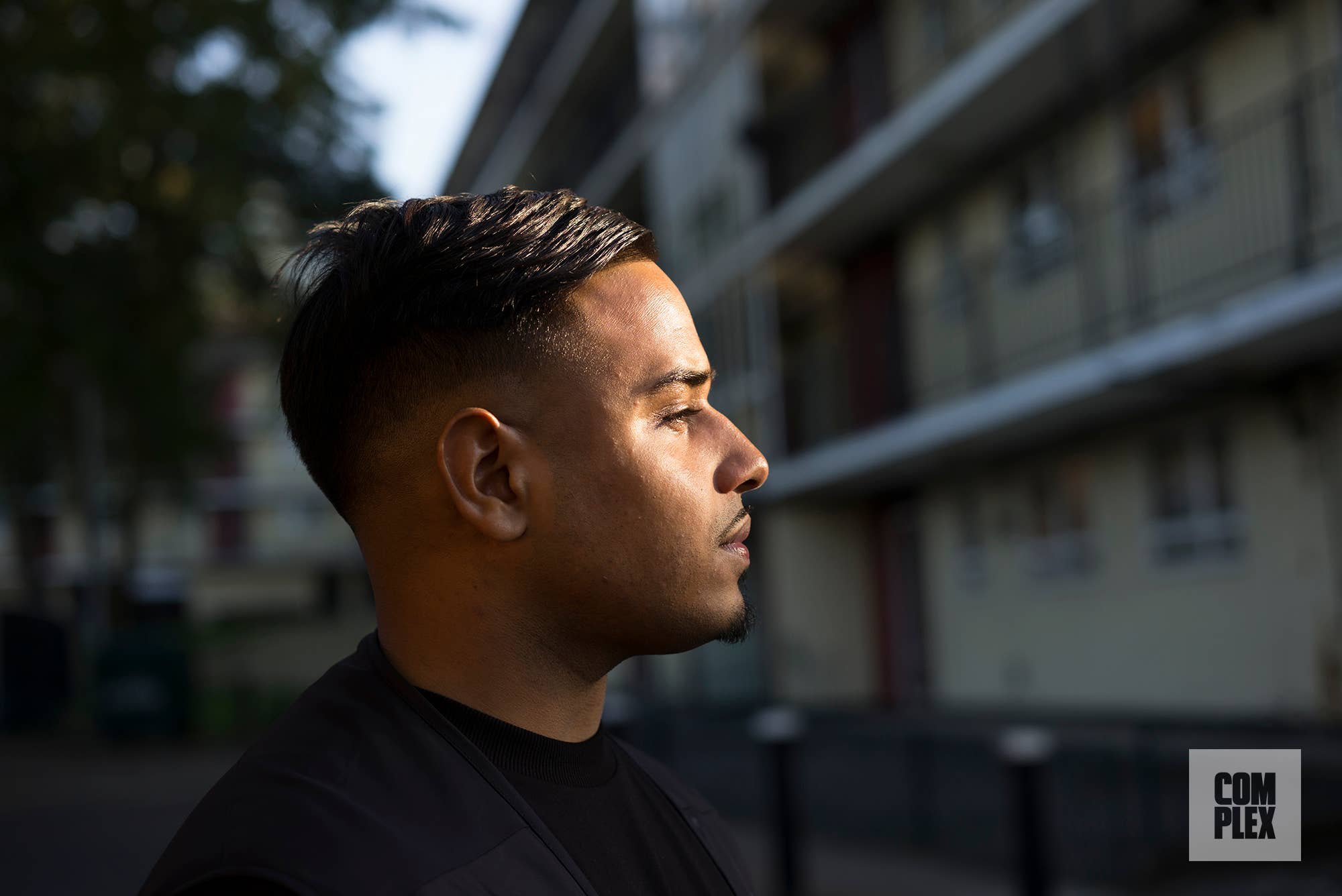
“I literally just got an email this minute,” Mim Shaikh says, excitedly pointing at his smartphone screen. His eyes sparkle with the prize of recent self-discovery. “It’s from someone who heard about the documentary. He says he didn’t see his dad for 23 years,” he continues. “I grew up feeling like I was the only person going through this. Now I’m learning that there are so many people out there with the same story.”
Mim and I are sat in a French bistro in Battersea, South West London. It’s that time in the late-afternoon when the outer-city calms down before the melee of rush hour. Autumnal sunlight pours through the window; we’ve stopped to have a drink after walking around the grounds of a local housing estate, whose roads and alleyways branch-off from the high street. They are the very same paths Mim frequented as a child, when he lived here in a first-floor council flat with his mother and grandmother. Back then, he was young enough to access the purity of innocence: having his yo-yo stolen by the boys his gran would pay £5 to walk him to school, whilst she was busy financing their household and caring for his mother. But he was also old enough to lean on the railings, peer over the car park, and think to himself: Where is dad?
“I lacked confidence, I felt lost, and less ‘masculine’ in the conventional sense. I’d look at my friends and their dads and wonder what it must feel like. I always knew I wanted to go on this journey, but I recently decided the best way for me to process it would be to make a documentary,” Mim explains.
The BBC Radio 1Xtra presenter, actor and spoken-word commentator describes his new documentary, Finding Dad, as the “most life-changing thing I have ever done.” Directed by filmmaker Lottie Gammon, it is an open, moving exposé of a young man navigating his way between complex familial ties, languages and continents in search of his father.
Mim’s quest starts with him opening an envelope containing photographs of his dad, and the viewer is invited on his descent into the emotional depths of his family history. He tries to make sense of the injustices his mother faced after his birth, in Birmingham, as a vulnerable young woman forced to marry an abusive older man. When Mim was six months old, with the support of his matriarchal grandmother—the unquestionable heroine of this story, like so many of those which remain untold about first-generation immigrant family members—his mother left her husband to start a new home in South London. Mim lived across different households throughout his childhood, including foster care residence, as he faced an adolescence without a father figure.
When certain difficult things happen in the British Asian community, they’re often swept under the carpet.
I ask why he chose to open-up about his journey to find his dad on camera.
“Being asked at every stage of the process: what was that like? How do you feel? It was therapeutic. And I feel like by having it all caught on camera, I could be my rawest self. It’s more transparent, because it picks everything up, every nuance, every effect. I can’t lie to the camera,” he admits.
The turning point of the documentary occurs in Dudley, a town just outside of Birmingham. Having travelled to the Midlands in search of his father’s last known whereabouts, after a series of dead-ends whilst knocking on doors in the gloomy rain, Mim is invited into the home of three senior members of the local mosque.

“When I walked into their home, I went into full protection mode. I was telling myself: ‘These lot are gonna tell you that your dad’s passed away. Get ready for that.’ So when they nodded at the photos and said they knew him, and even knew where he was... It was one of the most powerful moments of my life.”
I suggest to Mim that the documentary’s nuanced depiction of British-Pakistani life is uniquely refreshing; a vantage point for understanding the untold struggles that exist beneath the labels of themes such as arranged marriages and economic migrancy. It’s not often on mainstream, unscripted television that the private spaces of British-Asian, let alone British-Muslim, families are afforded such sensitive access. Here, the voices of Mim’s family members—cousins, aunties, and his foster-mother, who is a family friend—alongside the characters he leans on for support, are interwoven in a real-time story of love and progress, rather than being demonised or caricatured, as all-too-often happens in the UK’s mainstream media.
“These guys invited me into their house. They gave me tea, they gave me custard creams, and told me about my dad. The image that gets told about Muslim Asian men in the news media perpetuates the same stereotypes, of grooming gangs or terrorists,” says Mim. “These men gave me their time. They said to me: ‘The moment you meet your dad, that will bring us happiness, because we helped you find him.’ I left the house feeling so touched and proud.”
Whilst addressing the sticky topic of fatherlessness through the lens of Mim’s particular identity, perhaps more importantly the documentary acknowledges it as a universally accessible challenge; one that will hold weight across diasporic and native communities, alike.
“When certain difficult things happen in the British-Asian community, they’re often swept under the carpet,” Mim explains. “Discussing them is seen as taboo. You tell everyone that you’re all good, but nah, I’m not all good! So with the doc, it’s me saying: let me lift up the carpet and show all the stuff I’ve been dealing with my whole life, because it’s been driving me insane. But more than anything else, I’m trying to tell a universal story, about a young man getting in touch with his dad. Yes I’m Pakistani, I’m British, I’m speaking Urdu throughout, but there is an important narrative to show that whilst it was me who went on this journey of reconnection, at the end of the day I’m a human going through something that lots of people go through.”
In the climax of the documentary, whilst sat in the shadows of a staircase in rural Azad Kashmir, Pakistan—the first time he has visited the country—Mim finally breaks down. Moved by his travels and discoveries, he expresses a renewed appreciation for the role that his late-grandmother played in his upbringing.
“It shows how strong an immigrant woman can be: leaving her own country behind and still thriving; taking responsibility for someone else’s life,” he says. “It’s the same for my foster-mother: she’s an amazing lady, she’s looked after kids of different races for years, be they black, white or Asian. She does that for a living. There aren’t many images of strong Asian females, or powerful women full-stop, in society. But I want these people to be seen as that, because that’s how it’s been from my perspective.”

I ask him what he would like the impact of the documentary to be for people watching it.
“We had a screening in Birmingham recently and there was a Q&A afterwards. People came up to me and started telling me about their own experiences. One person said: ‘I had the same experience, but it was with my mum; I’ve never met her—what do I do!?’ And it felt like that person had never communicated it to anyone ever before. Everyone’s situation is different, so people go through these things in their own way. But if that type of interaction can be amplified, and if it creates a discourse around fatherlessness so people start to understand it more as an issue and see what impact that has on a young person growing up, then job done.”
As we leave the restaurant, we walk past the road whose curbs hold between them Mim’s formative childhood memories. He looks up at the concrete block of flats and cloud-covered sky. I ask him what impact filming the documentary has had on his own life.
“I’m at peace,” he replies. “I have answers, and the ability to conversate about my dad. Imagine something that has been nonexistent your whole life switching to becoming existent? But that thing is the norm for every other human being on the planet. It’s mad, bro.”
'Finding Dad' is available to watch on BBC Three via BBC iPlayer from October 18.

